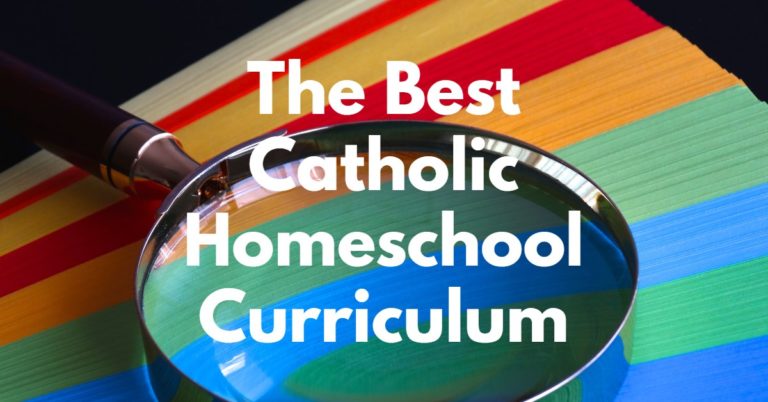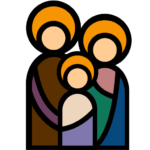Which is the Best Catholic Homeschool Curriculum?

How to Choose Your Homeschool Curriculum
When parents think about starting to homeschool, one of the first questions asked is, “What curriculum should I use?” While there are lots of sources of Catholic homeschool curriculum, this is actually not an easy question to answer. In fact, the answer is that there are lots of answers. It’s simple to understand that families—composed of individuals with different temperaments, learning styles, and interests—are unique. So, there is no one best curriculum for everyone and no one-size-fits-all program. To complicate it even more, there may not even be one best curriculum for a single family. Different curricula take different approaches. Throw in the option of unschooling, and you may consider throwing in the towel before you even start.
But take heart! While it may not be a simple question to answer, there are lots of options out there for a Catholic homeschooling parent to choose from. From a traditional approach to learning to classical education style curriculum to Charlotte Mason, Montessori, and more, there is a style for everyone.
You may feel stuck even trying to understand what “curriculum” means? Is it a bunch of workbooks? Is it textbooks with quizzes and tests? Is it online courses? Is it literature-based? How do I teach math? You can think of it this way—a curriculum is a path for you to follow. You may be successful staying on the path and stopping at every checkpoint. More likely, you’ll stray off this path, take some side roads, and maybe skip a few stops along the way. And that’s just fine. Most homeschoolers try out a few curriculum choices before they settle on what works for them.
So, how you choose the right curriculum for your family? Here are a few considerations to guide you in your decision-making process:
Think about your goals
It is not enough to say that you want a good education for your children so they can go to college. This goal is not much different from that of parents who send their kids to a typical school. Homeschooling is a way of life, and Catholic homeschoolers seek to infuse their faith into learning that takes place in the bosom of the family. A homeschooling family should want a good education, yes, but also an increase in virtue, a joyful environment, and the glorification of God.
How can a curriculum choice reflect such goals? Starting with Catholic sources is a great first step. You will want to evaluate whether a curriculum style increases joy and virtue practice in your home. If it works counter to that, then it isn’t a good fit. Frustration with a curriculum program isn’t the best way to learn and grow in joy. The curriculum you choose should help you, not hinder you.
Think about your comfort level
If you feel anxious about jumping out on your own, then unschooling or an eclectic curriculum may not be the best choice for you. Some curriculum choices appeal to a more traditional schooling model. This would include supplied books, often textbooks, weekly schedules, quizzes and tests, and support with grading. If you want your children to have a classical education, there are curriculum choices that can meet those goals.
Think about how much you want to do on your own
Some curriculum choices provide it all—all books and materials, grading and testing services, and a curriculum plan laid out as a schedule. But you may want to choose from several sources of materials. You may want to keep your children on the same general topics even though they are in different grade levels. You may want to study history using original sources, historical fiction, and documentaries. You may want to outsource your math using a tutor.
Think about how much time you have
A family with a kid or two doing at-home learning with other kids in a school setting may approach choosing curriculum differently from a family with kids homeschooling from preschool to high school. Some curriculum choices offer a more hands-off approach, offering a full package of materials, lessons plans, online or video teaching, and grading services. Other curriculum choices could require you to do lesson prep, gather materials, and do a lot of the teaching. This is especially true if you end up combining several curriculum and learning resources. Before deciding on a curriculum, be realistic about how much time you can devote to planning and teaching, and then choose a curriculum that provides what you want and need.
Types of Curriculum
Traditional Homeschool Catholic Curriculum
This type of curriculum is closest to what you would find in a school setting. Generally, you can expect to use textbooks that are provided to you. There are assignments scheduled and an expectation of quizzes, tests, essays, and grading. Typically, you will also have a literature reading list, again with the books provided. Essays are assigned based on the reading.
- Seton Home Study
- Catholic Heritage Curricula
- Our Lady of Victory
- Our Lady of the Rosary
- Catholic Virtual
- Tan Academy
- Homeschool Connections
- St. Jerome School
Classical Catholic Homeschool Curriculum
Classical education is an education method rooted in tradition, seeking after the truth, goodness, and beauty of God’s creation. This is accomplished in the trivium, three stages of the liberal arts: grammar, logic, and rhetoric, plus astronomy, arithmetic and geometry, Latin, history, music, and art.
- Mother of Divine Grace
- St. Thomas Aquinas Academy
- Kolbe Academy
- Bellarmine Studies
- Classical Liberal Arts Academy
- Angelicum Academy
- Classically Catholic Memory
- Oxrose Academy
- Scola Rosa
- Catholic Schoolhouse
- Queen of Heaven Academy
- Aquinas Learning
- St. Thomas School
- Homeschool Connections
Charlotte Mason Catholic Homeschool Curriculum
The Charlotte Mason method has as its foundation the belief that the child is a human person with the right to an education of the whole person, not just his mind. It seeks to teach all that is true, good, and beautiful, with education being an atmosphere, a discipline, and a life. This method utilizes what Mason called “living books,” with narrative retell as an important component of learning.
Eclectic Homeschool Curriculum
Eclectic curriculum is a catch-all term for other curriculum sources. Many families choose to combine the best of several curricula or create their own. This curriculum choice takes more time and effort, but it best meets the need of a particular family and the individual children in that family.
Unschooling
Unschooling is home education that is a natural learning style. It is not a method of homeschooling, but rather independent learning that is based on experiences and the pursuit of individual interests. Some people mistakenly think that unschooling is choosing to not teach your children at all. Unschooling parents actively participate in their children’s education, providing support for the pursuit of the child’s interest. This typically eschew textbook and workbook learning. Thus, choosing an unschooling curriculum is an oxymoron. There really is no such thing.
Unschooling families do take advantage of lots of learning resources, however. This can include consulting booklists about interesting subjects, learning through field trips and classes, volunteering and working, and participating in co-ops. It may include videos and documentaries, community college classes, service work, and travel. Unschooling is a way for families to open up a myriad of learning opportunities for their children.
What If I Make the Wrong Curriculum Choice?
You may find that you purchase some curricula and then find that it doesn’t quite work for you or your children. Don’t worry—we’ve all been there. I don’t think you could easily find a homeschooler who hasn’t purchased a book or resource thinking it would be perfect, only to discard it after a few weeks. The truth is that there is some trial and error in choosing your family’s curriculum.
To keep from spending money on resources that you won’t end up using, plan to try before you buy (or at least give it a good once-over). Ask to borrow the curricula you’re interested in from friends. You can also contact curriculum providers and ask for samples of their products. You may be able to download pdf sample pages and tables of content.
Spend some time looking it over and examining how it is planned out. Consider the amount of time you would need to spend teaching it. Is it possible for a student to use it independently or would you need to actively teach it?
If you are able to attend a Catholic homeschool conference, you’ll find curriculum providers with their full line of offerings. You can take your time looking through the entire curriculum before you make a purchase. Remember that the curriculum providers at the conference are looking to make a sale. It can be tempting to make a large purchase when you see what’s available. If the company is offering a discount code tied to the conference, ask if you can use the code in the days or weeks after the conference. This will give you some time to process what you’ve seen and make a decision that isn’t pressured by the need for an immediate purchase on-site.
The Best Curriculum is What Works for Your Family
Approaching your curriculum choice with an open mind and a desire to do some research is the best way to find the best curriculum for you. God gave your children to you, and you know them intimately, including their strengths, struggles, and needs. After researching your choices, considering your own needs and wants, thinking about how your children learn, adding up your budget, and giving your favorites a test-run, the next best step is prayer. Trust that God will help you in your discernment and that he will fill in any gaps. The dedication and resolve to homeschool provides a foundation that will let learning and joy grow in your home with God’s grace to sustain us.

